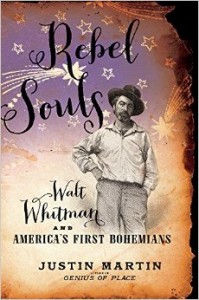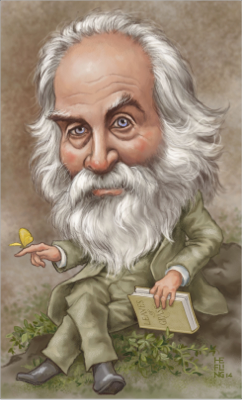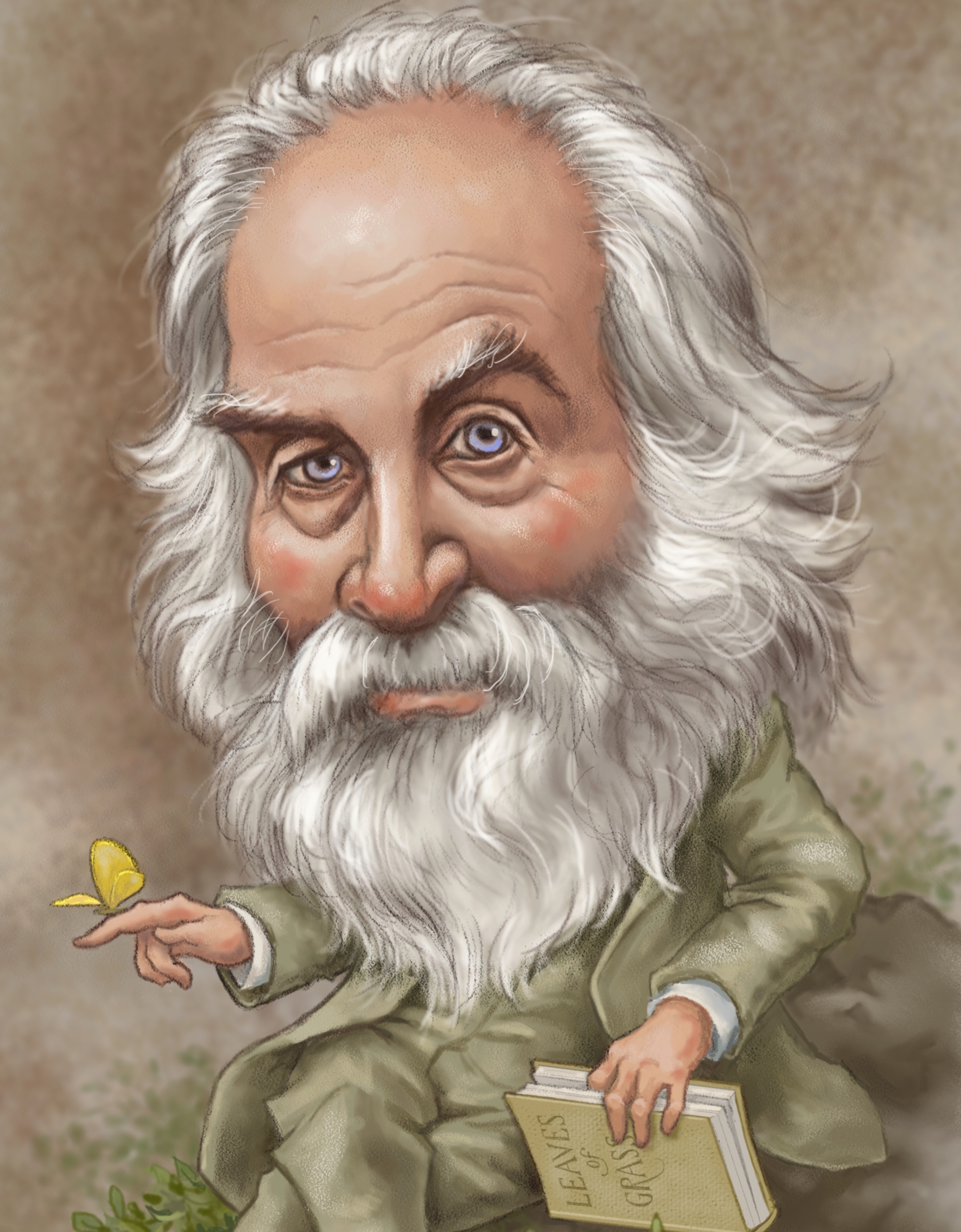 Rebel Souls: Walt Whitman and America’s First Bohemians
Rebel Souls: Walt Whitman and America’s First Bohemians
by Justin Martin
Da Capo Press. 339 pages, $27.99
Justin Martin, the author of Rebel Souls: Walt Whitman and America’s First Bohemians, is clearly a man of eclectic interests, having previously written biographies of Frederick Law Olmsted, Ralph Nader, and Alan Greenspan. He has now turned his attention to the biography of an entire group.
The group consisted of a number of writers and performers of varying talents who gathered in mid-19th century Manhattan at Pfaff’s, a basement saloon on Broadway between Houston and Bleecker Streets. The Diaghilev of this motley crew was the journalist Henry Clapp, a New Englander whose radical politics and avant-garde æsthetics had taken him to Paris in 1849, where he became so enamored with “la vie bohème” that he stayed for three years, returning to New York determined to create an American version of the cultural life he’d found so thrilling in Paris. He also launched a monthly journal, the Saturday Press, which despite having fewer than 5,000 subscribers became the most important organ of advanced writing in the U.S. (Among other coups, it published Whitman’s “Out of the Cradle Endlessly Rocking” and a short story called “The Celebrated Jumping Frog of Calaveras County” by an unknown writer who called himself Mark Twain.)
Whitman was the foremost member of the group, which also included Artemus Ward, America’s leading humorist; the actor Edwin Booth (brother of Lincoln’s assassin); Hugh Ludlow, author of the scandalous and wildly popular “The Hasheesh Eater”; Charles Warren Stoddard, an early proponent of homosexual rights; and Adah Menken, whose body stocking performances in potboiler dramas made her a trans-Atlantic sex symbol. Nightly gatherings at Pfaff’s were free-wheeling, free-thinking affairs that also functioned as a mutual help and admiration society. It seems clear that Whitman benefitted most from the group, joining at a low point in his career just after the second edition of Leaves of Grass had appeared to little fanfare and much opprobrium. Clapp was so convinced of Whitman’s genius that he used the Saturday Press to promote Leaves at every opportunity, publishing 25 items by or about Whitman in a single year.
Whitman was also drawn to Pfaff’s because it was one of the few commercial places in New York that welcomed homosexuals. The Clapp group met in a private  alcove, but Whitman also spent time in the larger room, which accommodated what he called his “beautiful boys” and “my darling, dearest boys.” “We all loved each other more than we supposed,” he wrote to a friend, expressing the sad hindsight of the closeted homosexual. In fact, Pfaff’s was as close to a gay bar as anything mid-19th century Manhattan had to offer, and it provided the setting for some of the poems in the homoerotic “Calamus” sequence that first appeared in the 1860 edition of Leaves of Grass.
alcove, but Whitman also spent time in the larger room, which accommodated what he called his “beautiful boys” and “my darling, dearest boys.” “We all loved each other more than we supposed,” he wrote to a friend, expressing the sad hindsight of the closeted homosexual. In fact, Pfaff’s was as close to a gay bar as anything mid-19th century Manhattan had to offer, and it provided the setting for some of the poems in the homoerotic “Calamus” sequence that first appeared in the 1860 edition of Leaves of Grass.
Although a worthwhile book, Rebel Souls has several problems. Errors of grammar and diction abound, and tenses shift from past to present and back for no good reason. Criminals are “hung,” not hanged; a Maryland battlefield is “blood-sotted”; and Martin succumbs to the inelegant practice of creating nouns by adding “ness” to adjectives (“indiscriminateness” being one of many ugly results). He’s also guilty of the biographer’s sin of attributing to his subjects things he can’t possibly know. When Adah Menken attempts suicide by swallowing poison, we’re told that “She lifted the vial to her lips and took a long draw.” Maybe it was a long draw, maybe it was a quick gulp, but whatever it was, this sort of thing is annoying and unnecessary. Sometimes Martin forgets that his reader isn’t as familiar with his material as he is: “No American writer ever had such chances of success as Fitz-James O’Brien … and but one American writer ever threw such chances away so recklessly.” And who might that one reckless writer be? We’re not told. “Clapp had spent time with women such as Octavie”—who is … a countess? a courtesan? You’ll search in vain for an explanation.
More serious is Martin’s skewed assessment of Whitman’s poetry. He seems to admire “O Captain, My Captain,” a hugely popular poem then as now, but one of the worst and least characteristic of things Whitman ever wrote. (It embarrassed him for the rest of his life.) Martin says that the 1860 third edition of Leaves is, in part, “obscene,” a breathtaking opinion that parrots the Puritanical view of Whitman’s most benighted critics, and he adds that in that same edition “Moments of supernatural clarity follow muddied stretches of utter artistic chaos.” Whitman can be metaphorically dense, yes, but artistically chaotic? Never. Such grossly wrong-headed views are only slightly mitigated by Martin’s placing Whitman in the company of Homer and Dante, which is precisely where he belongs.
Despite these caveats, however, the book is both engaging and helpful, of value to scholars and general readers alike. Martin is a companionable guide who juggles his large cast of characters with aplomb, and his narrative line is always clear and energetic. He also provides helpful and fascinating cultural and historical context throughout. During the decade or so that Clapp’s crowd gathered at Pfaff’s, the United States went through seismic events. The Dred Scott decision of 1857 was followed by the Panic of the same year, the first worldwide economic crisis. Two years later saw John Brown’s attempted raid at Harper’s Ferry, and the following year the newly formed Republican Party nominated Abraham Lincoln as its presidential candidate. Within months of Lincoln’s election, the Civil War began, and four years later it was concluded on the eve of his assassination. All during this period, Congress was at least as dysfunctional as it is today, if you can imagine such a thing—sometimes erupting in violent brawls on the floors of both chambers. (In 1856 Senator Preston Brooks of South Carolina caned Senator Charles Sumner of Massachusetts so badly that Sumner never fully recovered.)
This historical and cultural context enriches Martin’s narrative and also provides the opportunity for delightful discoveries along the way, such as the news that “The phrase well rounded derives from phrenology and is based on the notion that an actualized person has a nicely shaped head, without any distortive bumps.” Notwithstanding its flaws, then, Rebel Souls is an enjoyable and a valuable read, and Justin Martin is to be commended for shining a light on this neglected but influential group in our cultural history.
Alan Helms is professor emeritus of English at UMass-Boston and the University of Paris. His dance reviews can be found at DanceTabs.com.






